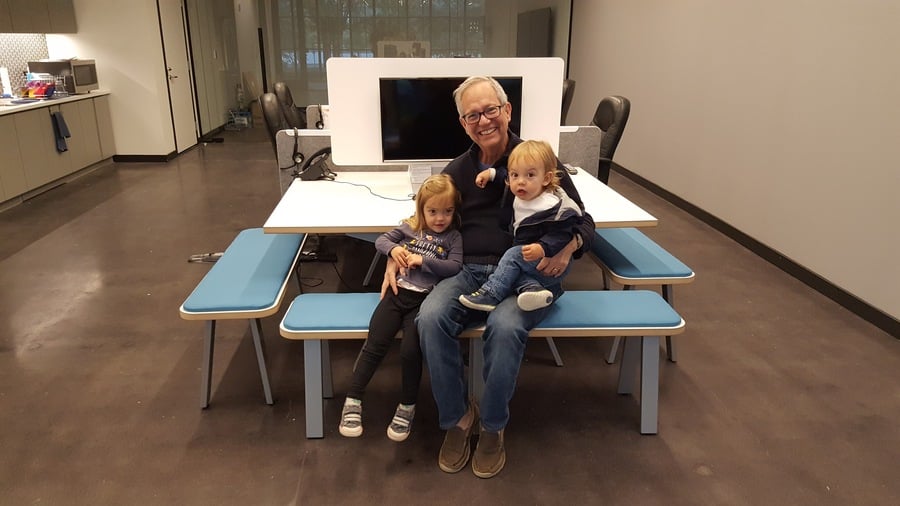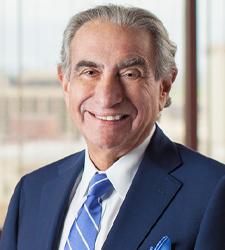

While some folks scamper toward a campaign promoted as “the great resignation,” there remains a tidy core of financial advisers who refuse to recognize the notion of retirement despite being well past traditional retirement age.
“I retired once when I was 40 because I thought I had enough money, but after a few months I went back to work. And then at 55, I retired again and played golf for a few months before going back to work,” said Joseph Biondo, the 83-year-old founder of Biondo Investment Advisors, a $900 million firm in Milford, Pennsylvania.
“I’m gonna retire when I die,” he added, underscoring a theme among so-called super senior advisers of blending work and life.
Biondo, like many of his contemporaries across wealth management, stands out for going against the grain of the trend toward working less and retiring early.

While analysts and prognosticators for years have been forecasting a major transition as baby boomer advisers drift off to comfortable retirements, there seem to be a lot of seniors who didn’t get the memo.
“My mental and physical capacity that I have may or may not reflect my 81 years, but I’m positioning myself to continue performing as if I’m much younger,” said Isidoro Korngold, co-founder and chairman of the board at Intercontinental Wealth Advisors, a $1.7 billion firm in San Antonio.
“Staying active keeps me young,” Korngold added, citing his upbringing and family history among the reasons he has no plans to retire.
“I come from a family where my father was active until 94 and lived to 101,” he said. “That’s the environment I lived through, with the experience of my father working for that long. Hopefully, I will continue to do so.”
In many ways, the wealth management industry that was mostly limited to commission brokers and insurance salespeople when senior advisers started in the business has evolved and the job has gotten easier.
“Technology has changed beyond dramatically,” said Porter “Buddy” Ozanne, president and founder of Probity Advisors, a $700 million firm based in Dallas.
Ozanne, who turns 74 in June, recalls using a “hi-tech” Friden calculator that had 100 keys to add, subtract, multiply and divide.
Even though he appreciates and utilizes today’s modern technological conveniences that enable him to keep up, Ozanne admits to occasionally longing for simpler times.
“Financial planning software today is complex,” he said. “Technology today enables us to do so many different scenarios. It makes it a lot easier to get it right, but it also makes it a lot easier to get it wrong.”
Having entered the business in 1971 as a field rep at an insurance company owned by his father, Ozanne recognizes the changes that have occurred in wealth management.
“From the days when I started, there was no such thing as independent advisers,” he said. “You either worked for a major broker-dealer or you sold life insurance using financial planning as a means of selling life insurance.”
Ozanne’s transition to fee-based financial planning began in 1998 and it took him four years to get $25 million under management.
A common theme among the senior advisers is a simple love of the work that's not driven by any need for extra income or lack of a succession plan.
“I have no current retirement plans; I’m having fun, I’m in great health,” said Eddie Brown, 81, founder of Brown Capital Management, a $17.5 billion firm based in Baltimore, Maryland.
Brown transitioned in January from chief executive to executive chairman as part of a gradual succession plan, but it would be a mistake to assume he's heading for the rocking chair anytime soon.
“This signals to the world that we have a succession plan,” Brown said of his move to the executive chairman role.
Not focusing on or even really acknowledging retirement is standard fare with this group.
A key ingredient might be the ability to spend more time looking forward and less time looking backward.
Daniel Hawley, who turns 72 next month, is the founder of Hawley Advisors Wealth Planning, a San Francisco-based shop managing $60 million.
In the business for more than 40 years, including 20 years as an independent adviser, Hawley is addressing the daunting reality of outliving his clients.
“We’re now employing a marketing strategy to bring in new clients because the old clients are dying off,” he said.
Hawley has brought on a younger adviser to succeed him and he has a “loose affiliation” with a $200 million RIA that might lead to a merger. Beyond that, it’s business as usual.
“I’ll work for as long as I want to because it’s not physically demanding work,” he said. “My average client relationship is 25 years. One day you wake up and realize you’ve been in the business for 40 years and you’re 72. It’s more about the relationships than it is about making money.”
Frank Corrado, managing director and principal at Robertson Stephens, turns 70 in June and his focus is squarely on the next stage of his long career.
Starting as an accountant right out of college in 1974, Corrado joined J.P. Morgan in 1979, where he recalls having to wait in line to use the computer. “Everything was done on paper back then,” he said.
From there, Corrado eventually went independent, got certified as a registered life planner, and merged his business, Blue Blaze Financial Advisors, with Robertson Stephens in 2019.
“My clients thought it was a payday and that I was retiring,” he said. “It was not. My purpose was to be part of a broader organization.”
While plenty of mergers are driven by the need for a succession plan, Corrado, who's based in Holmdel, New Jersey, said he merged for the benefits of scale.
“The point was to be able to have the platform to be able to do what I really wanted to do,” he said. “That’s the passion that keeps me going. I’m not just working with a client; my mission is to be one of the top five influencers in my clients’ lives. I want to be one of the first five calls they make if they need help.”
As far as retirement goes, Corrado treats it as a foreign concept.
“If you define retirement as not working, I don’t think I could ever do that,” he said. “Most people my age are downsizing to retirement communities and I’m putting in a whole new backyard. The two most precious resources are money and time, and as you get older, time is everything. Once you control your time, you then truly have financial freedom.”
Put another way, Hawley believes people like him are just not cut out for traditional forms of retirement.
“If you’ve been engaged at the executive level, it’s hard to put it down even after you retire,” he said. “I have seen so many clients retire, and they’re miserable. And all those people who are driving around being influencers and all that crap are gonna realize one day they don’t like waking up living in a van in a parking lot.”

"This shouldn’t be hard to ban, but neither party will do it. So offensive to the people they serve," RIA titan Peter Mallouk said in a post that referenced Nancy Pelosi's reported stock gains.

Elsewhere, Sanctuary Wealth recently attracted a $225 million team from Edward Jones in Colorado.

The giant hybrid RIA is elevating its appeal to advisors with a curated suite of alternative investment models, offering exposure to private equity, private credit, and real estate.

The $40 billion RIA firm's latest West Coast deal brings a veteran with over 25 years of experience to its legacy division for succession-focused advisors.

Invictus fund managers allegedly kept $10 million in plan assets after removal, setting off a legal fight that raises red flags for wealth firms.
Orion's Tom Wilson on delivering coordinated, high-touch service in a world where returns alone no longer set you apart.
Barely a decade old, registered index-linked annuities have quickly surged in popularity, thanks to their unique blend of protection and growth potential—an appealing option for investors looking to chart a steadier course through today's choppy market waters, says Myles Lambert, Brighthouse Financial.
